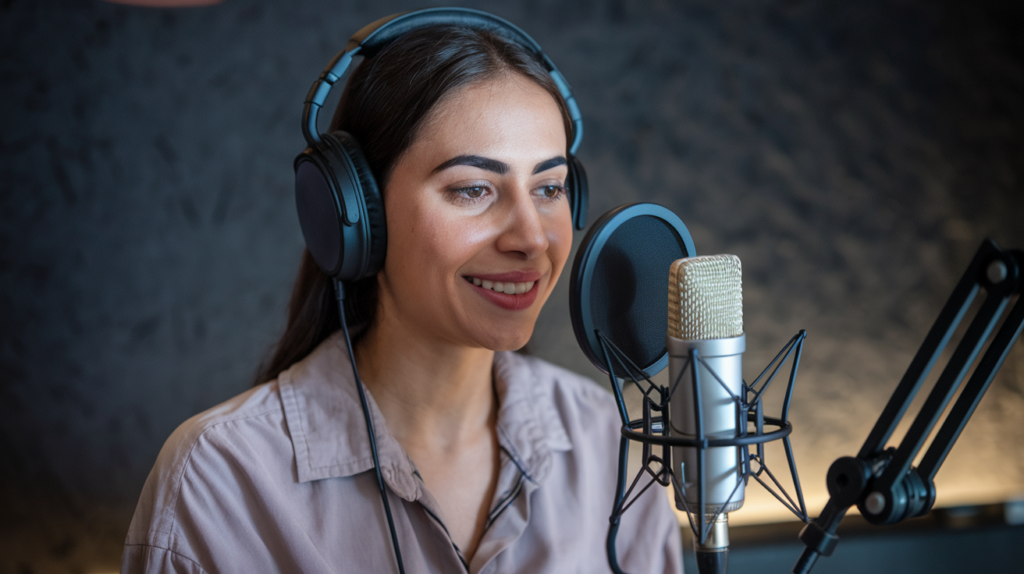Arabic voice artists play a pivotal role in bringing scripts to life for audiences that speak one of the most widely spoken languages in the world. Their work involves using professional voiceover techniques to deliver authentic, culturally appropriate, and engaging performances for various media, including advertisements, films, e-learning, video games, and more. Here, we explore the nuances of Arabic voice artist services and their significance in voiceover projects.
Arabic Voiceover Services
The Importance of Native Proficiency
An Arabic voice artist must possess native fluency or near-native fluency in the language to ensure proper pronunciation, intonation, and cultural relevance. With Arabic’s rich linguistic diversity, understanding the subtleties of Modern Standard Arabic (MSA) and various regional dialects is crucial.
Applications of Arabic Voiceover Services
Arabic voice artists are in demand across industries for a variety of applications:
- Corporate Narration: For businesses targeting Arabic-speaking regions, corporate videos require professional voiceovers to establish credibility.
- E-learning: Online courses and training materials in Arabic demand clear and engaging voiceovers to ensure comprehension.
- Entertainment: Films, TV shows, and video games often include Arabic dubbing or localized characters.
- Advertisements: Companies marketing products in Arabic-speaking countries rely on voiceovers to resonate with their audience.
Gender-Specific Needs
Brands and projects often require either a male or female Arabic voice artist, depending on the tone and target demographic. Female voices might be preferred for warmth and approachability, while male voices may be selected for authority and gravity.
Arabic Language: Nuances and Challenges in Voiceovers
Dialects and Regional Variations
Arabic is not a monolithic language; it has many dialects, each with its own unique characteristics. Voice artists must be well-versed in the target audience’s dialect to ensure authenticity. The main categories include:
- Modern Standard Arabic (MSA): Used in formal contexts, media, and education across Arabic-speaking countries.
- Egyptian Arabic: Popular in entertainment due to the prominence of Egypt’s media industry.
- Levantine Arabic: Spoken in Lebanon, Jordan, Syria, and Palestine, it’s widely used in regional advertising.
- Gulf Arabic: Predominant in the Arabian Peninsula, ideal for business-related voiceovers in the Gulf region.
- Maghrebi Arabic: Common in North Africa, including Morocco, Algeria, and Tunisia.
Challenges in Arabic Voiceover Projects
- Complex Pronunciation: Arabic’s phonetics include sounds not present in many other languages, such as the emphatic consonants (e.g., ص, ض).
- Text Direction: Arabic is written from right to left, which can affect syncing text with visuals in subtitled or animated projects.
- Cultural Sensitivity: Scripts must be adapted to avoid expressions that might not align with Arabic-speaking cultures.
Accents and Dialects in Arabic Voiceover
Importance of Dialect Selection
Selecting the right dialect or accent for a project is essential to connect with the intended audience. For instance, an advertisement targeting a Gulf audience would benefit from a Gulf Arabic accent, while a documentary with a pan-Arab appeal might use MSA.
Neutral Accent in Arabic Voiceovers
Modern Standard Arabic serves as a neutral option for projects spanning multiple Arabic-speaking regions. It ensures comprehension across borders while maintaining a professional tone.
Accent Adaptation by Voice Artists
Experienced Arabic voice artists can adjust their accent and pronunciation to match specific regional requirements. This flexibility is particularly valuable in projects aiming for localized impact.
Why Hire a Professional Arabic Voice Artist?
Expertise in Script Interpretation
A skilled Arabic voice artist brings the right emotion, tone, and pacing to scripts, making the content relatable and engaging.
High-Quality Recordings
Professional Arabic voice artists typically work with state-of-the-art recording equipment in soundproof studios, ensuring crystal-clear audio quality.
Cultural Adaptability
From adjusting idiomatic expressions to understanding local sensitivities, professional voice artists ensure that the content resonates with the intended audience.
Versatility Across Media
Whether it’s a corporate video, animated film, or radio commercial, a professional Arabic voice artist delivers performances suited to various mediums.
Arabic voice artists combine linguistic expertise with cultural understanding to deliver voiceovers that captivate audiences. Their work ensures that content in Arabic is not only heard but felt and understood.







